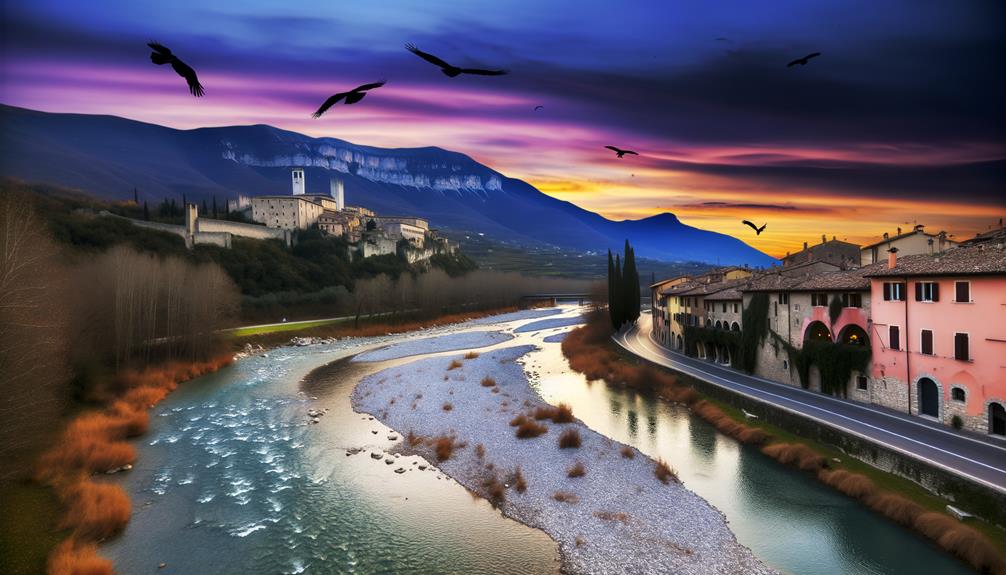Meaning of the Name Ravenna
The name Ravenna has its roots in the ancient Etruscan word 'Rasenna' and is later adapted into Latin. It is associated with the Proto-Indo-European root '*reu-', meaning 'to flow', possibly reflecting the city's geographical connections.
Historically, Ravenna was a significant naval base and capital for the Western Roman Empire and the Byzantine Exarchate, symbolizing power and cultural amalgamation. The name carries a legacy of artistic inspiration, enriched by its mention in works by Dante and Byron.
For further insights into its lasting influence and modern significance, there is more to uncover.

Key Takeaways
- The name Ravenna is derived from the Etruscan word 'Rasenna', reflecting ancient linguistic traditions.
- Ravenna symbolizes resilience, cultural amalgamation, and historical prominence, particularly as a former capital of the Western Roman Empire.
- The name evokes images of renaissance, rebirth, and natural symbolism, rooted in its rich Italian heritage.
- Ravenna has inspired notable literary works and represents mystery, beauty, and depth in artistic forms.
- The resurgence in popularity reflects a contemporary appreciation for its storied past and cultural significance.
Etymology of Ravenna
The etymology of the name Ravenna is deeply rooted in ancient linguistic traditions and historical contexts. Derived from its Latin origins, Ravenna's name is believed to have evolved from the Etruscan word 'Rasenna,' which referred to the Etruscan people themselves. This connection underscores the city's significant ties to Etruscan culture and influence.
Additionally, the Latinized form 'Ravenna' may also be linked to the Proto-Indo-European root '*reu-' meaning 'to flow,' potentially referencing the city's historical waterways. The convergence of these linguistic elements highlights the multifaceted heritage embedded within Ravenna's name, reflecting a blend of cultural and geographical influences that have shaped its identity over centuries.
Understanding these origins provides a richer appreciation of Ravenna's ancient legacy.
Historical Significance
Rooted in its ancient past, Ravenna holds a pivotal role in history due to its strategic location and rich cultural tapestry. Situated near the Adriatic Sea, this Italian city served as an essential naval base and a gateway between the East and West.
Its historical significance is magnified by its role as the capital of the Western Roman Empire, the Ostrogothic Kingdom, and the Byzantine Exarchate. The name Ravenna itself evokes a legacy of power and cultural amalgamation, symbolizing the city's importance in shaping European history.
Linguistically, 'Ravenna' may derive from the Etruscan or Latin roots, reflecting the diverse influences that have left indelible marks on its storied past.
Ancient Ravenna
Emerging from the mists of antiquity, Ravenna's origins trace back to a time when it was an essential settlement for both Etruscan and Umbrian civilizations. The city's strategic location and fertile lands made it a pivotal hub for early trade and cultural exchanges.
The name 'Ravenna' possibly derives from the Etruscan word 'Rasenna,' reflecting its deep-rooted connections to these ancient cultures.
Key historical highlights include:
- Etruscan Influence: Etruscan artifacts and architectural remains showcase the city's early prominence.
- Umbrian Settlement: The Umbrians contributed significantly to the region's linguistic and cultural development.
- Roman Conquest: Ravenna later became a focal point of Roman military and administrative power.
This layered history underscores Ravenna's enduring legacy in the annals of ancient civilizations.
Ravenna in Literature
Ravenna's rich tapestry of history and cultural significance has inspired an array of literary works that capture its essence and allure.
Dante Alighieri sought refuge in Ravenna, where he completed his magnum opus, 'The Divine Comedy.' The city's Byzantine mosaics and medieval charm influenced his vivid descriptions of paradise.
Lord Byron, too, found Ravenna a fertile ground for creativity, penning several poems while ensconced in its evocative atmosphere.
Moreover, Oscar Wilde's 'The Ravenna' celebrates the city's melancholic beauty. The etymological roots of 'Ravenna' trace back to pre-Roman times, hinting at its ancient and mystical aura.
This blending of historical context and linguistic depth has rendered Ravenna an enduring muse for writers across centuries.
Cultural Impact
The name Ravenna carries significant cultural weight, rooted in its historical prominence as a city that once served as the capital of the Western Roman Empire.
This historical significance has permeated into various forms of media and literature, where Ravenna often symbolizes a nexus of power and transformation.
The enduring legacy of Ravenna's name reflects its profound impact on both historical narratives and contemporary storytelling.
Historical Significance
In tracing the historical significance of the name Ravenna, one uncovers its profound cultural imprint across various epochs and regions. Linguistically, the name is believed to derive from the Latin "Ravenna," possibly linked to the Etruscan term "ra," meaning water, reflecting the city's strategic position near the Adriatic Sea.
Historically, Ravenna served as the capital of the Western Roman Empire, the Ostrogothic Kingdom, and the Exarchate of Ravenna, highlighting its geopolitical importance. Culturally, it became renowned for its stunning Byzantine mosaics and architectural marvels, influencing European art and architecture.
Key historical facets include:
- Western Roman Empire Capital: Administrative and military significance.
- Byzantine Art Influence: Renowned mosaics.
- Geopolitical Hub: Strategic maritime location.
Media and Literature
Beyond its historical prominence, the name Ravenna has permeated media and literature, serving as a symbol of artistic and cultural richness. Its evocative resonance can be traced to various artistic forms, where it often signifies mystery, beauty, and depth. In literature, Ravenna has been a muse for poets and novelists, encapsulating themes of ancient splendor and melancholic beauty. The city's name often appears in works that explore historical contexts or embody a romanticized past.
| Media Type | Example Work/Author |
|---|---|
| Poetry | Lord Byron's "Ravenna" |
| Literature | Oscar Wilde's "The Sphinx" |
| Film | "Ravenna" in "Snow White" |
| Music | "Ravenna" by Tortoise |
This cultural impact underscores Ravenna's enduring legacy as a beacon of artistic inspiration.
Popularity Over Time
Over the centuries, the name Ravenna has experienced fluctuating levels of popularity, influenced by cultural, historical, and linguistic factors. Originating from the ancient Roman city of Ravenna in Italy, the name has traversed various epochs, each leaving its distinct imprint.
- Classical Antiquity: During the Roman Empire, Ravenna rose to prominence, with its name becoming synonymous with imperial power and maritime prowess.
- Medieval Period: The name's allure waned as Ravenna's political and economic significance diminished, yet it retained a certain romanticism in medieval literature.
- Renaissance Revival: The Renaissance rekindled interest in classical names, including Ravenna, which saw a modest resurgence in scholarly and artistic circles.
These historical phases shaped the name's trajectory, mirroring societal shifts and cultural renaissances.
Ravenna in Modern Times
In contemporary settings, the name Ravenna maintains its cultural resonance, drawing from its rich historical tapestry and associations with the ancient city in Italy.
Its modern usage sees a notable uptick, reflecting broader trends in naming conventions that favor historical and evocative origins.
This surge in popularity underscores a renewed fascination with names that carry both aesthetic appeal and profound heritage.
Cultural Significance Today
Ravenna, with its rich historical tapestry and linguistic heritage, continues to hold cultural significance in modern times through its vibrant arts scene and enduring architectural marvels. This Italian city, deeply rooted in its ancient past, serves as a beacon of cultural continuity and renewal. The name 'Ravenna' itself evokes a sense of historical grandeur and resilience, reflecting its evolution from a Roman capital to a contemporary cultural hub.
Here are three aspects that underscore Ravenna's cultural significance today:
- Mosaic Art: Renowned for its Byzantine mosaics, Ravenna remains a premier destination for art enthusiasts.
- Historical Sites: The preservation of UNESCO World Heritage sites attracts scholars and tourists alike.
- Festivals: Annual cultural festivals celebrate its rich artistic and historical heritage, enhancing community engagement.
Popularity and Trends
Throughout recent decades, the name 'Ravenna' has experienced a resurgence in popularity, reflecting a growing appreciation for its historical and linguistic roots. Originating from the Italian city renowned for its Byzantine mosaics and rich cultural tapestry, 'Ravenna' evokes a sense of timeless elegance and storied past.
This renewed interest can be attributed to a broader trend where parents seek names that are both distinctive and culturally significant. Linguistically, 'Ravenna' is believed to derive from the Latin term 'ravenna,' possibly linked to the Etruscan word for water, highlighting its ancient origins.
Modern usage of the name often conjures images of beauty, history, and a connection to heritage, making it a favored choice among contemporary parents.
Notable Namesakes
Several prominent individuals throughout history have borne the name Ravenna, each contributing to its rich cultural and historical tapestry. This name, resonant with classical elegance and depth, has been associated with figures of varied backgrounds and accomplishments.
Notable namesakes include:
- Ravenna Helson – A distinguished psychologist whose pioneering work in career development and personality psychology has greatly influenced the field.
- Ravenna Michalsen – An acclaimed American singer-songwriter and composer, celebrated for her contributions to contemporary Buddhist music.
- Ravenna Tran – A notable environmental activist advocating for sustainable practices and climate change awareness, inspiring many through her influential campaigns.
These individuals exemplify the diverse domains in which the name Ravenna has made its mark, enriching its historical and cultural significance.
Symbolism and Meaning
The name Ravenna, steeped in historical and linguistic significance, carries with it rich connotations derived from its roots in the ancient city of Ravenna, Italy. Historically, Ravenna was a crucial center during the Roman and Byzantine Empires, symbolizing resilience and cultural amalgamation.
Linguistically, the name may trace back to the Latin word 'Ravenna,' possibly linked to 'rapum,' meaning a type of root vegetable, hinting at foundational strength. Symbolically, Ravenna evokes images of renaissance and rebirth, reflective of the city's storied past.
The name also resonates with natural imagery, akin to the raven bird, often seen as a harbinger of transformation. Therefore, Ravenna embodies a blend of historical gravitas, linguistic depth, and rich symbolism.
Conclusion
The name Ravenna, rich in etymology and historical significance, has traversed through ancient civilizations, literature, and modern culture, embodying diverse meanings and symbolisms. The city of Ravenna, located in the Emilia-Romagna region of Italy, has served as the capital of the Western Roman Empire and later the capital of the Ostrogothic Kingdom. Its name is thought to have originated from the Etruscan word “rha,” meaning “river,” or from the Celtic word “rha,” meaning “plain. ” Additionally, the name Ravenna has been linked to the meaning of anne, which carries connotations of grace and favor. This rich history and linguistic significance make Ravenna an intriguing and multifaceted destination for those interested in exploring the intersection of ancient civilizations and modern culture.
For instance, the historic city of Ravenna in Italy, once the capital of the Western Roman Empire, exemplifies the name's enduring legacy.
This multifaceted name, intertwined with cultural and literary narratives, continues to resonate, reflecting both a storied past and contemporary relevance.
Such depth of meaning underscores Ravenna's enduring allure and cultural importance.






